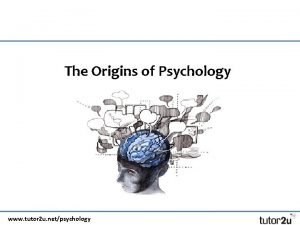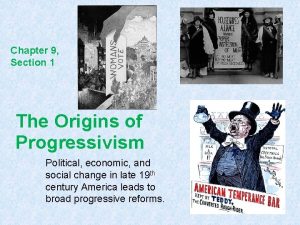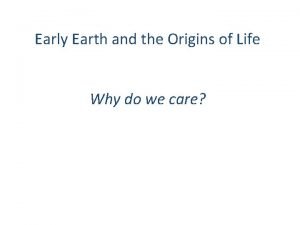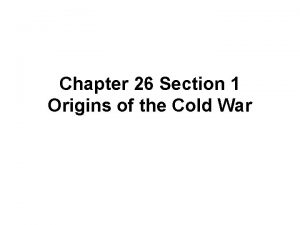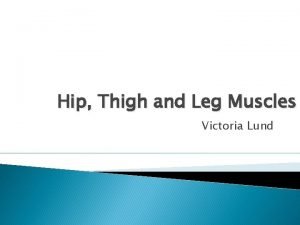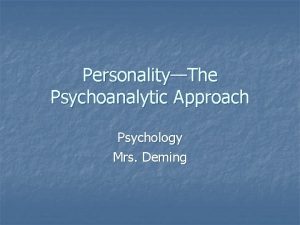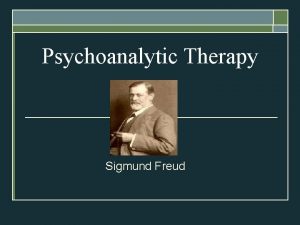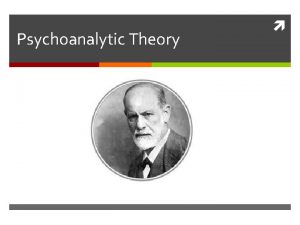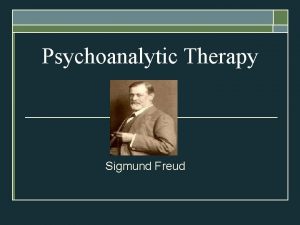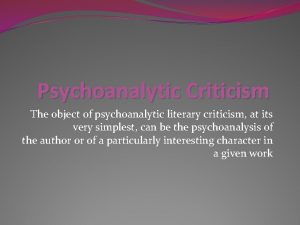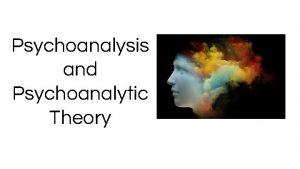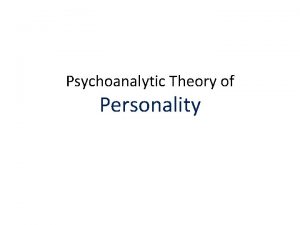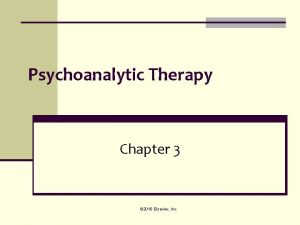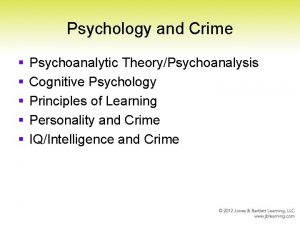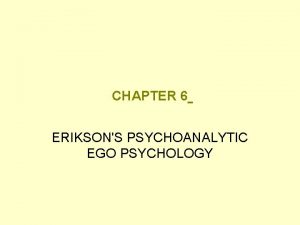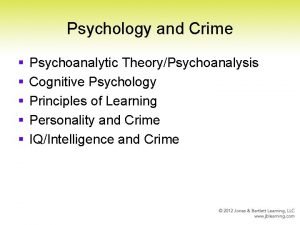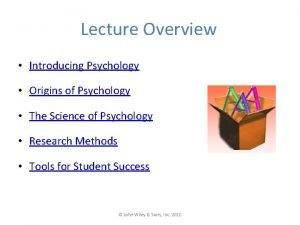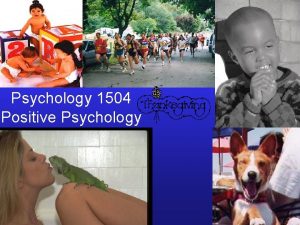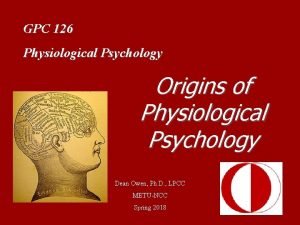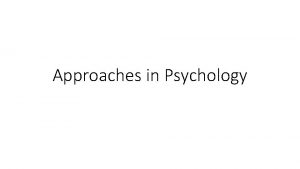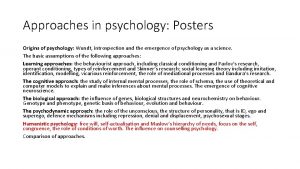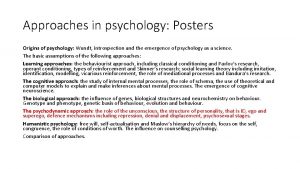Psychoanalytic Psychology Psychoanalytic Psychology A Overview 1 Origins

























- Slides: 25

Psychoanalytic Psychology

Psychoanalytic Psychology A. Overview 1. Origins: clinical cases of uppermiddle class patients in turn-of-century Vienna 2. Subject Matter: special emphasis on unconscious determinants of personality and behavior

Psychoanalytic Psychology A. Overview 3. Goal: to uncover and understand the unconscious determinants of personality and behavior 4. Method of Study: extensive analysis of individual case studies 5. Areas of Interest: personality dynamics, personality development, psychoanalytic therapy

Psychoanalytic Psychology A. Overview 6. Contributors a. Sigmund Freud

Freud’s Residence in Vienna, Austria

Sigmund Freud Park in Vienna, Austria

Psychoanalytic Psychology A. Overview 6. Contributors b. Carl Jung

Psychoanalytic Psychology A. Overview 6. Contributors c. Alfred Adler

Psychoanalytic Psychology A. Overview 7. Criticisms 8. Impact

Psychoanalytic Psychology B. Personality Dynamics: Organization of Personality 1. Id a. product of evolution b. pleasure principle c. primary process

Psychoanalytic Psychology B. Personality Dynamics: Organization of Personality 2. Ego a. product of reality b. reality principle c. secondary process

Psychoanalytic Psychology B. Personality Dynamics: Organization of Personality 3. Super-ego a. product of socialization b. perfection c. ego-ideal d. conscience

Psychoanalytic Psychology B. Personality Dynamics: Organization of Personality 4. Anxiety a. reality anxiety: external world b. neurotic anxiety: id c. moral anxiety: super-ego

Psychoanalytic Psychology B. Personality Dynamics: Organization of Personality 5. Defense Mechanisms for Dealing With Anxiety a. repression b. denial c. regression

Psychoanalytic Psychology B. Personality Dynamics: Organization of Personality 5. Defense Mechanisms for Dealing With Anxiety d. rationalization e. intellectualization f. projection

Psychoanalytic Psychology B. Personality Dynamics: Organization of Personality 5. Defense Mechanisms for Dealing With Anxiety g. displacement h. reaction formation i. sublimation j. compensation

Psychoanalytic Psychology C. Personality Development: Psychosexual Stages of Development 1. Oral Stage a. 1 st year b. pleasure derived from oral stimulation c. weaning an important process

Psychoanalytic Psychology C. Personality Development: Psychosexual Stages of Development 2. Anal Stage a. 2 nd year b. pleasure derived from process and control of elimination c. toilet training an important process anal retentive vs anal expulsive

Psychoanalytic Psychology C. Personality Development: Psychosexual Stages of Development 3. Phallic Stage a. 3 - 5 years of age b. pleasure derived from genitals and interest in other gender parent c. Oedipus complex d. Electra complex

Psychoanalytic Psychology C. Personality Development: Psychosexual Stages of Development 4. Latency Stage a. childhood to adolescence b. less attention to bodily pleasures c. attention to skills for coping with environment and peers

Psychoanalytic Psychology C. Personality Development: Psychosexual Stages of Development 5. Genital Stage a. adolescence and beyond b. pleasure derived from mature sexual relationships with others 6. Fixation

Psychoanalytic Psychology D. Psychoanalytic Therapy: Psychoanalysis 1. Cause of disorders 2. Goal of therapy 3. Processes and Techniques a. Hypnosis b. Free association c. Interpretation

Psychoanalytic Psychology D. Psychoanalytic Therapy: Psychoanalysis 4. Results and Outcomes a. Transference b. Abreaction/Catharsis c. Insight d. Working Through e. Symptom Substitution

Psychoanalytic Psychology D. Psychoanalytic Therapy: Psychoanalysis 5. Training a. Medical Degree (M. D. ) b. Psychiatric Training c. Psychoanalytic Training (including undergoing psychoanalysis)

Psychoanalytic Psychology D. Psychoanalytic Therapy: Psychoanalysis 6. Drawbacks a. Extensive Process b. Expensive Process c. Difficulty in disproving basic concepts
 Origins of psychology tutor2u
Origins of psychology tutor2u Vaudeville theatre history
Vaudeville theatre history What is the scoring system in tennis
What is the scoring system in tennis The orgin of species manhwa
The orgin of species manhwa History of tao te ching
History of tao te ching Datanugget
Datanugget Historical origins of the health belief model
Historical origins of the health belief model Chapter 15 origins of biological diversity answers
Chapter 15 origins of biological diversity answers History of greek theatre
History of greek theatre Unit 7 lesson 4 medians and altitudes
Unit 7 lesson 4 medians and altitudes The origins of progressivism chapter 9 section 1
The origins of progressivism chapter 9 section 1 Origins of the cold war
Origins of the cold war Origins of american government vocabulary
Origins of american government vocabulary Origins
Origins Chapter 18 section 1 origins of the cold war
Chapter 18 section 1 origins of the cold war Chapter 3 section 4 the origins of judaism answer key
Chapter 3 section 4 the origins of judaism answer key Chapter 26 section 1 origins of the cold war
Chapter 26 section 1 origins of the cold war History of curriculum
History of curriculum Ancient rome and the origins of christianity
Ancient rome and the origins of christianity Taoism origins
Taoism origins Tone of beowulf
Tone of beowulf Chapter 2 origins of american government answer key
Chapter 2 origins of american government answer key Thisisis
Thisisis Hip and leg muscles
Hip and leg muscles Jazz dance origin
Jazz dance origin Father of psychology
Father of psychology
